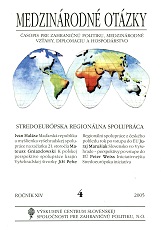Maďarská republika a myšlienka vyšehradskej spolupráce na začiastku 21. storočia
Hungary and the Idea of Visegrad Cooperation at the beginning of the 21st Century
Author(s): Iván HalászSubject(s): Politics / Political Sciences
Published by: Research Center of the Slovak Foreign Policy Association (RC SFPA)
Keywords: Maďarsko (Hunagry); Vyšehradská štvorka (Visegrad Four); stredoeurópska spolupráca (Central European Cooperation); dilemy (dilemmas)
Summary/Abstract: The article addresses three main issues. Its first part is dedicated to reflection of Hungarian foreign policy and the levels at which it is implemented covering: The World, Euro-Atlantic area, Europe/ European Union, post-communist Eastern and Central Europe, Danube basin region and Carpathian basin. In all cases mentioned the article provides a short analysis of Hungarian point of view, and basic issues presently on the agenda. This introduction is important mainly because it helps the reader to understand the so-called Visegrad idea and the role it plays in Hungarian politics and society. Second part is dedicated to introduction of historical background and how it has shaped Hungary’s Central European identity. It indicates basic milestones of its formation – the dissolution of the Habsburg empire, the loss of attributes of a superpower status and feeling of regional „belonging to an empire”, the changes in geopolitical situation, disappointments with alliances with great powers. Moreover, it contains the ideas behind the re-definition of Central Europe as a part of Soviet Eastern bloc, as well as its dissolution in 1989, which actually enabled the emergence of Visegrad regional framework for cooperation of Czechoslovakia, Hungary and Poland. The third part deals with foundation, perception and development problems of the idea of Visegrad co-operation in Hungary. The strongest emphasis is placed on the position of particular governments, as well as the Hungarian society on this issue. Moreover, the so-called “social basement of Central European cooperation” is described – encompassing a romanticist as well as pragmatic adherents of cooperation of countries in the region of Central Europe. One can say that over the last decade, the idea of Visegrad in Hungary gained a lot of moderate supporters who greatly outnumber its critics.
Journal: International Issues & Slovak Foreign Policy Affairs
- Issue Year: XIV/2005
- Issue No: 04
- Page Range: 6-22
- Page Count: 16
- Language: Slovak

